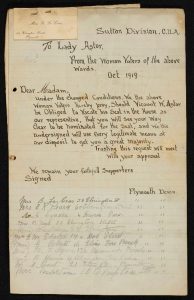

Betty Le Cras, ‘Petition to Stand’ 29/10/1919. University of Reading Special Collections, Political Elections 1919-1935, Best Wishes Before Election MS1416/1/1/1730.
The 100-year anniversary of women in Parliament brought with it a host of celebrations, discussions, and reflections on the achievements and legacies of women in British history. Among the various events hosted at the University of Reading, an online exhibition was produced with 50 archival records digitised relating to the political career of the first women to take her seat in Parliament in 1919, Nancy Astor of Plymouth Sutton. The first document published on the Astor100 Twitter page exactly 99 years after her election success was a petition written by the women of her consistency.
The petition featured a series of names from the new female electorate in the Plymouth Sutton constituency demonstrating their support for Astor to run for election. With the anticipation that Nancy’s husband Waldorf would vacate his seat in the Commons to occupy his late father’s seat in the House of Lords, the voting public began to speculate his replacement. The enthusiasm for Astor to represent Plymouth Sutton extended beyond the female demographic. Remarkably popular in her constituency, Astor won the by-election by a large majority, securing 18.6% more of the vote than her closest competitor, and enjoying 26 uninterrupted years in Parliament before resigning in 1945.
The publication of the petition in the digital exhibition immediately captured the attention of the people of Plymouth, being shared across several social media platforms and featuring in local news outlets. Characterised as perhaps the first ever #AskHerToStand moment, the impact of circulating the petition was remarkable. The names were retweeted by the official Lady Astor Statue campaign alongside the caption ‘Let’s find their granddaughters…’, sparking a revival of interest in local women’s history and new wave of support to the crowdfunding campaign.
Its significance extended beyond the scope of women’s history and provided the foundation for a discussion on the local history of Plymouth. The addresses listed indicated the existence of areas of Plymouth that had been lost during the Plymouth Blitz in WWII. Not only were streets physically lost, but the series of bombing raids eradicated historical records of them – something that the circulation of the document has began to help fill the gaps of.
Reactions to the exhibition emphasised the importance and power of material culture in modern history. Everything from the handwriting of the participants, to the nail holding the business card of Astor’s counting agent, Betty Le Cras, aroused the attention of members of the public. Small idiosyncrasies were reminisced and speculated upon by potential descendants of the constituents.
The nostalgia from the people of Plymouth that emerged from the search brought about a sentimental value to the anniversary. Members of the public contacted researchers associated with the Astor100 project offering information about their relatives and street names in the communal effort to identify the signatories. The enthusiasm behind it underpinned huge part of the centenary that sought to address the effort and progress of all women in the political world; notwithstanding the contribution of ‘ordinary’ women. An initial response from a historical researcher based in Devon articulated this feeling: ‘These aren’t the wives of “the great and the good” of Plymouth. They are ordinary working-class women’. The interest that developed from this document captured the essence of the centenary; great achievements for women by women.
Melanie Khuddro is a doctoral researcher and sessional lecturer at the University of Reading, and a member of the Astor100 team.


Pingback: ☀️No new blog this week - we're... by @genderhist_Rdg - Twitter Threads by Threadix